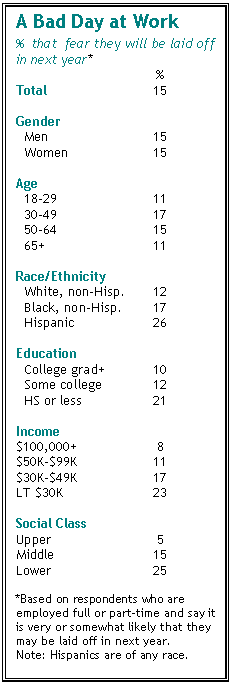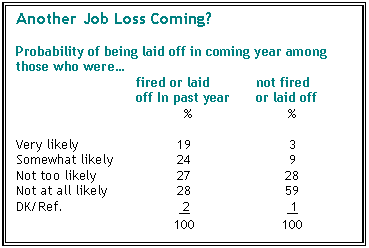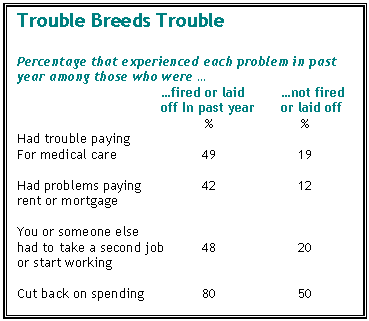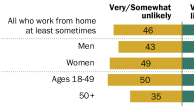
At a time when the American economy is trending down and the unemployment rate is ticking up, one out of every seven U.S. workers fear they will be laid off in the next 12 months, according to a recent Pew Social and Demographic Trends survey.
The telephone survey of 2,413 adults, conducted from Jan. 24 through Feb. 19, 2008, finds that 15% of all workers say it is at least somewhat likely that they will be laid off in the coming year while 84% say there is little or no chance they will lose their job.
Fear of falling into the ranks of the unemployed varies dramatically across key demographic groups. Fully a quarter of all employed Hispanics (26%) say they fear they’ll be let go in the next 12 months, about double the proportion of non-Hispanic whites (12%) and significantly more than the 17% of blacks who are concerned about layoffs.
Those least able to afford losing a paycheck are the most likely to be concerned that they’ll lose their job. Nearly one-in-four (23%) workers with family incomes below $30,000 fear they’ll be laid off in the coming months, as do 21% of those with a high school degree or less education.
In contrast, relatively few working adults with college degrees (10%) or those who earn $100,000 or more (8%) say they’re at much risk of being laid off.
As these findings suggest, Americans on the lower rungs of the social and economic ladder feel the most vulnerable to losing their jobs. One-in-four adults who say they are members of the lower class fear they will be laid off this year — five times more than the share of Americans who identify with the upper classes.
Job Concerns Only the Latest Problem for these Worried Workers
Current job concerns are most frequent among those who have already undergone recent economic problems.

For example, those who say it’s likely they will lose their job are more than twice as likely as other workers to say they had trouble getting or paying for needed medical care in the past year (43% vs. 18%).
They’re also twice as likely to report having trouble paying their mortgage or rent (28% vs. 13%) or to say that they or someone in their family had to take another job because money was tight (49% vs. 23%). And fully three-quarters say they had to cut back on household spending last year because money was tight, compared with half of all other workers.
Looking Back: Who Lost Their Jobs in the Past Year?
The survey also found that about one-in-seven adults (14%) reported being laid off or fired in the previous 12 months — virtually identical to the proportion that fear it’s likely they’ll lose their job in the year ahead. In fact, losing your job emerged as the best predictor of current job concerns. Fully 43% of those who recently lost their jobs say it’s at least somewhat likely that they will be laid off in the year ahead.
One caution: The survey’s estimate that 14% of all adults were laid off or lost a job in the past year is somewhat higher than the rate suggested by federal employment data. In 2006, the federal Bureau of Labor Statistics (BLS) estimated that 9.1% of all workers had experienced a bout of unemployment in the previous year.
The survey sample includes retirees and those whose family responsibilities keep them from seeking work outside the home. In contrast, the BLS estimate is based on all workers, excluding retirees and those with family responsibilities that keep them out of the labor market. Looking only at those in the Pew sample who currently are employed full-time, 9% say they were fired or laid off last year, or about equal to the 2006 BLS estimate. Among those in the poll who are currently working part-time, one-in-six (17%) say they lost their job last year. Nearly four-in-ten (38%) of those who are not currently employed and not yet retired also report that they were recently fired or laid off.
Minorities, the young and the less well-educated are disproportionately likely to say they have suffered job loss in the past year than are whites, middle-aged adults or college graduates. Adults under the age of 50 — especially those younger than 30 — are particularly vulnerable. According to the survey, about one-in-five adults under the age of 30 was fired or laid off last year, as were about two-in-ten blacks (21%) and Hispanics (19%).

The survey findings offer support for the conventional wisdom that more schooling equals better job prospects. About two-in-ten adults with no more than a high school education say they lost a job last year — a job loss rate three times greater than the rate among college graduates and significantly greater than the loss rate of those who went to college but did not graduate.
Lost Ground, but Will Make It Up
Overall, a near majority (47%) of adults who recently lost their job report they’re not doing as well now as they were five years ago, compared with slightly more than a quarter (28%) of other Americans. At the same time, adults who recently lost a job were optimistic that things will get better for them. In fact, they were significantly more likely than other adults to predict they would make significant progress in the next five years (63% vs. 52%) and were no more likely to be pessimistic about their futures than Americans.
While most workers who experienced job losses were more likely to say they’ve lost ground in recent years, it is important to note that a significant minority report that they did not. In fact, about a third (32%) say they made at least some progress in the past five years, while another 18% said they were about where they were five years ago.

While just over half (52%) also say they’re doing better now than their parents at a similar age, that percentage is significantly smaller than the proportion of other Americans who express this view (67%). Job loss, however, has not diminished their faith that their children will be better off than they are — 46% expect their children to have a better standard of living, virtually identical to the proportion of other Americans who didn’t find themselves without a job.
Job Loss and Other Attitudes
Losing a job is not just a blow to the pocketbook. Whatever the direction of causality if any, the survey finds a modest but consistent relationship between job loss and a more cynical and fatalistic view of life.
According to the survey, nearly half (46%) of those who lost a job recently agreed that “success in life is pretty much determined by forces outside our control,” a view shared by only about a third of other Americans (34%). About three-quarters agree with the view that “the rich just get richer while the poor get poorer,” a sentiment expressed by two-thirds of other adults. The recently jobless are also 9 percentage points more likely to believe that most rich people today are wealthy because of personal connections or family money, and not as a result of their own hard work. Americans who lost a job in the previous year also are somewhat more likely to be dissatisfied with the direction of the country as a whole (72% vs. 61%).




